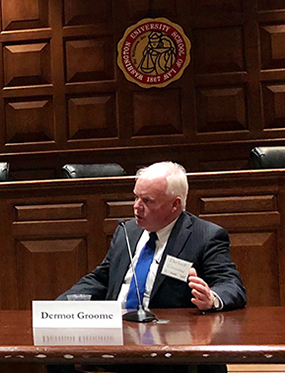PROFESSOR DERMOT GROOME PARTICIPATES IN PANEL IN HONOR OF THE LATE JUDGE PATRICIA WALD, FORMER CHIEF JUSTICE OF THE COURT OF APPEALS FOR THE DISTRICT OF COLUMBIA
by Dermot Groome, Professor of Law and Harvey A. Feldman Distinguished Faculty Scholar
October 2019 — Professor Dermot Groome participated in "The Role of the ICTY in Understanding War and Genocide in Bosnia and Herzegovina," a symposium held at Washington University in St. Louis School of Law on October 4, 2019.

Groome spoke on a panel dedicated to the memory of Judge Patricia Wald, former Chief Justice of the Court of Appeals for the District of Columbia, who died earlier this year. After retiring from the Court of Appeals, Judge Wald became a judge at the International Criminal Tribunal for the former Yugoslavia (ICTY) where she served as both a trial and appellate judge.
Groome gave an overview of her important contributions to the law of genocide in cases such as the Jelisić Appeal Judgment and the Krstić Trial Judgment, which was the first judgement to find that the killing of over 7,000 men and boys in Srebrenica in 1995 constituted the crime of genocide. Groome placed these important judgments in the overall context of genocide jurisprudence and set out his views regarding why establishing genocide as a crime still presents significant challenges for prosecutors and courts.
Other panels included presentations from victims, historians and social scientists. The symposium concluded with a screening of The Trial of Ratko Mladic, the 2019 PBS Frontline documentary on the last trial Groome led as a prosecutor. The documentary will be screened in Carlisle on October 26, 2019 at Dickinson College as part of the Genocide, Justice and Hope event. Additional information can be found here.
Professor Dermot Groome is a Professor of Law and the Harvey A. Feldman Distinguished Faculty Scholar at Penn State Dickinson Law. Much of his teaching, scholarship, and service focus on emerging areas of human rights and international criminal law and draw upon his deep expertise and experiences. After starting his career in the Manhattan District Attorney’s Office where he was a member of the Sex Crimes Unit and after working in Jamaica, W.I. on issues of community development, human rights, and children’s rights, Professor Groome worked in Cambodia. While in Cambodia, he served as a Legal Advisor to the International Human Rights Law Group, helped lead an investigation into a 1997 attack on peaceful protestors and drafted a report for the UN Security Council, helped the Cambodia Defender’s Project and Legal Aid of Cambodia investigate deaths in police custody, worked on issues related to the incarceration of children, and wrote a draft juvenile criminal procedure code. Professor Groome subsequently spent over 11 years as a senior war crimes prosecutor at the International Criminal Tribunal for the former Yugoslavia. He investigated and drafted the first genocide indictment against a sitting head of state, Slobodan Milošević, and was the Senior Trial Attorney for the Bosnia indictment. In total, Groome led the prosecution of five international criminal trials including the case against Ratko Mladić, who was convicted of genocide for the murder of over 7,000 men and boys in Srebrenica in 1995. He led eight large complex international investigations of senior military, political, and police officials. Groome’s cases all included crimes of sexual violence against women, men, and children. He was instrumental in the development of Joint Criminal Enterprise, a theory of criminal responsibility often used to assess the culpability of senior officials for the crimes committed by their subordinates. Two documentaries have been made about Professor Groome’s cases: The Trial of Ratko Mladić (PBS/Frontline 2019) and Crimes Before the ICTY: Višegrad (UN TV 2017).
In 2014, Professor Groome was a member of a panel of experts that issued a report on the effectiveness of the International Criminal Court (ICC). The report included over 190 recommendations for improving the ICC.
Professor Groome draws upon this expertise. His scholarship includes chapters about human rights in books published by Oxford University Press and Cambridge University Press, as well as articles published in U.S. law journals. He is the author of the Handbook of Human Rights Investigation (2nd ed. 2011), which the Humanitarian Law Center considers a “cornerstone text” in human rights and which Amnesty International has referred to as “an invaluable tool for those committed to documenting human rights abuses,” and which U.S. Aid translated into Arabic for human rights advocates in Iraq and Syria. Professor Groome’s current research agenda focuses on the Right to Truth and Right to Know, and how these rights should be expanded to allow the families of disappeared persons to access information in the possession of international organizations. Groome is also exploring changes to international law that would offer more protection for children during armed conflicts by preserving their civilian status vis-à-vis those who unlawfully conscript them.
In addition to teaching Criminal Law, International Criminal Law, and Human Rights, Groome oversees the International Justice Program, which offers Dickinson Law students an opportunity to pursue advanced international study and gain legal experience during a semester in The Hague working in one of the international courts. In 2017 and 2018, Groome, Professor of Law Gary S. Gildin, and Dickinson Law students developed a first-of-its-kind international trial advocacy program using courtrooms at the ICC. Professor Groome also advises governments and victims groups with matters pending before the ICC and international human rights bodies. He is the recipient of several awards, including the New York State Bar Association’s Elihu Root/Henry L. Stimpson Award for Public Service.